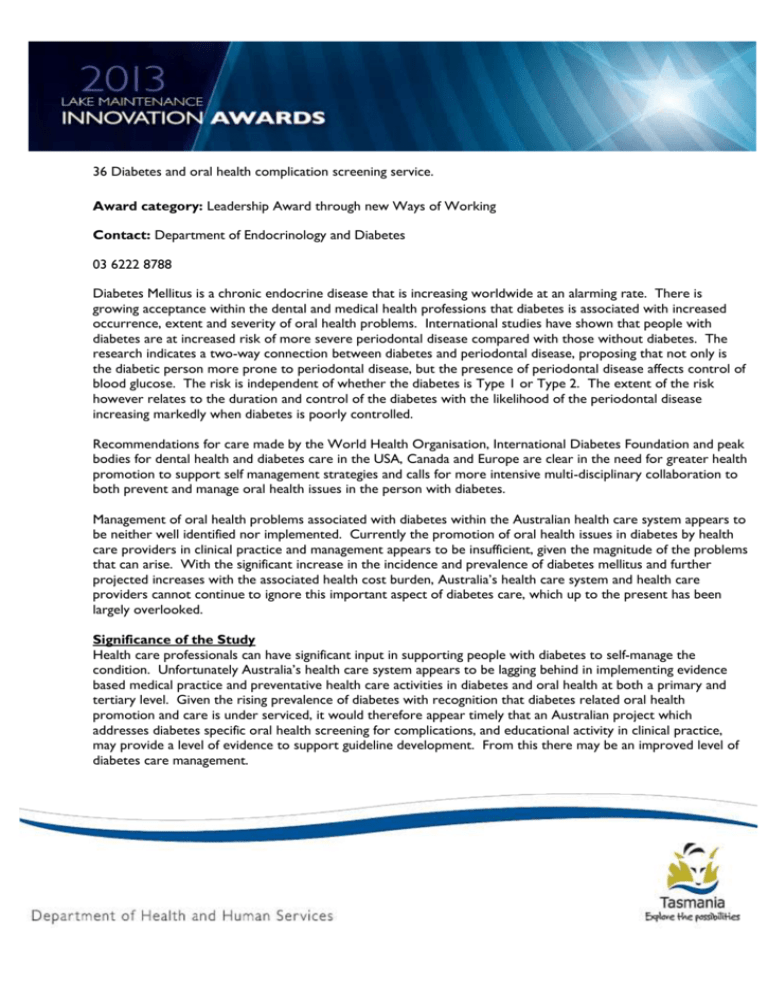Diabetes and oral health complication screening service-THO
advertisement

36 Diabetes and oral health complication screening service. Award category: Leadership Award through new Ways of Working Contact: Department of Endocrinology and Diabetes 03 6222 8788 Diabetes Mellitus is a chronic endocrine disease that is increasing worldwide at an alarming rate. There is growing acceptance within the dental and medical health professions that diabetes is associated with increased occurrence, extent and severity of oral health problems. International studies have shown that people with diabetes are at increased risk of more severe periodontal disease compared with those without diabetes. The research indicates a two-way connection between diabetes and periodontal disease, proposing that not only is the diabetic person more prone to periodontal disease, but the presence of periodontal disease affects control of blood glucose. The risk is independent of whether the diabetes is Type 1 or Type 2. The extent of the risk however relates to the duration and control of the diabetes with the likelihood of the periodontal disease increasing markedly when diabetes is poorly controlled. Recommendations for care made by the World Health Organisation, International Diabetes Foundation and peak bodies for dental health and diabetes care in the USA, Canada and Europe are clear in the need for greater health promotion to support self management strategies and calls for more intensive multi-disciplinary collaboration to both prevent and manage oral health issues in the person with diabetes. Management of oral health problems associated with diabetes within the Australian health care system appears to be neither well identified nor implemented. Currently the promotion of oral health issues in diabetes by health care providers in clinical practice and management appears to be insufficient, given the magnitude of the problems that can arise. With the significant increase in the incidence and prevalence of diabetes mellitus and further projected increases with the associated health cost burden, Australia’s health care system and health care providers cannot continue to ignore this important aspect of diabetes care, which up to the present has been largely overlooked. Significance of the Study Health care professionals can have significant input in supporting people with diabetes to self-manage the condition. Unfortunately Australia’s health care system appears to be lagging behind in implementing evidence based medical practice and preventative health care activities in diabetes and oral health at both a primary and tertiary level. Given the rising prevalence of diabetes with recognition that diabetes related oral health promotion and care is under serviced, it would therefore appear timely that an Australian project which addresses diabetes specific oral health screening for complications, and educational activity in clinical practice, may provide a level of evidence to support guideline development. From this there may be an improved level of diabetes care management. Prelimary data from this service to date indicates that the early detection and management of diabetes related oral health complications has made significant changes to the prevention and management of periodontal infections in people living with diabetes. Improvements in both glycaemic and lipid profiles have been detected in those individuals who have undergone dental management following diabetes specific oral health screening. Improved, healthy dietary choices (which assists glycaemic management), reduction of pain and improved quality of life factors have been reported by patients/clients as a result of the improved status in their oral health and level of dentition.






